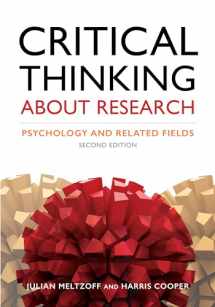
Critical Thinking About Research: Psychology and Related Fields
Book details
Summary
Description
To become informed consumers of research, students need to thoughtfully evaluate the research they read rather than accept it without question. This second edition of a classic text gives students what they need to apply critical reasoning when reading behavioral science research. It updates the original text with recent developments in research methods, including a new chapter on meta-analyses.
Part I gives a thorough overview of the steps in a research project. It focuses on how to assess whether the conclusions drawn in a behavioral science report are warranted by the methods used in the research. Topics include research hypotheses, sampling, experimental design, data analysis, interpretation of results, and ethics.
Part II allows readers to practice critical thinking with a series of fictitious journal articles containing built-in flaws in method and interpretation. Clever and engaging, each article is accompanied by a commentary that points out the errors of procedure and logic that have been deliberately embedded in the article. This combination of instruction and practical application will promote active learning and critical thinking in students studying the behavioral sciences.


We would LOVE it if you could help us and other readers by reviewing the book
Book review



